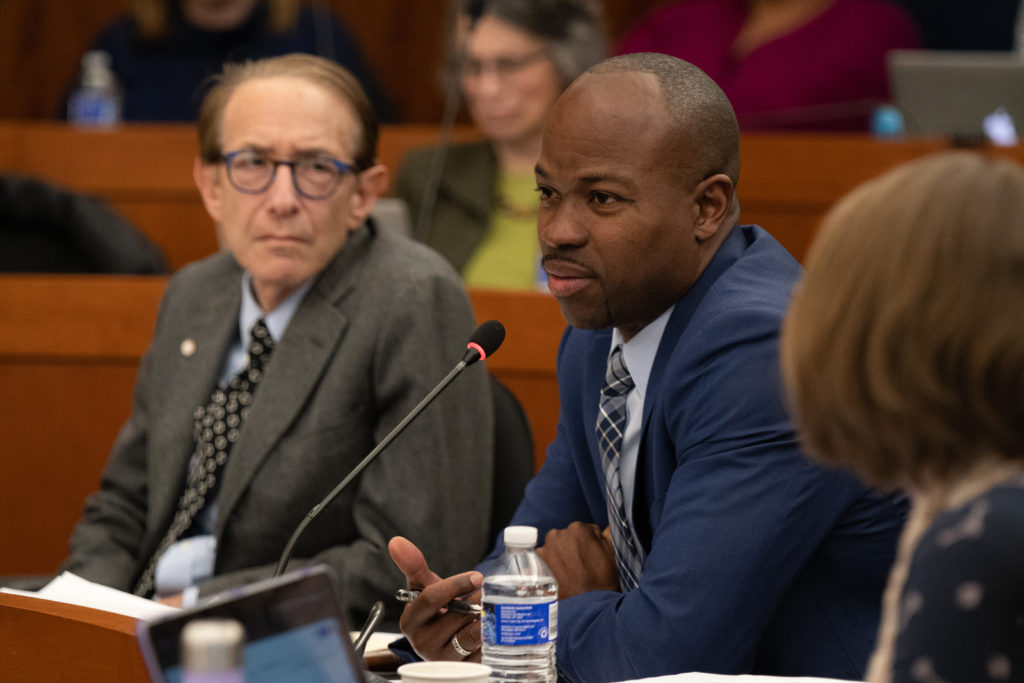Sherry Molock was a graduate student when a professor warned her not to do her research on Black people because she would get “pigeonholed.”
“I remember thinking, ‘You do research on White people, you’re not pigeonholed,’” she said.
Molock, now an associate professor of clinical psychology who studies suicide prevention in Black adolescents and young adults, said “top-tier” academic journals associated with the American Psychological Association are less likely to publish research on communities of color than research on predominantly White communities.
After she arrived at GW, Molock said the then-chair of her department told her to either change her area of study or add another expertise unaffiliated with the Black community to get published in academic journals. Otherwise, she would “hurt” her chances of earning full professorship, the chair said.
On the heels of nationwide protests against police brutality this summer, Joy Woods and Shardé Davis, both Black women in communications research, used #Blackintheivory in June to share their experiences of racism in higher education on Twitter. Since then, thousands of students and faculty members across universities like Yale began using the hashtag to share their stories of discrimination and bias in academia.
Molock is one of almost a dozen faculty at GW who said they weren’t surprised by stories detailed in the Twitter campaign, adding that they’ve faced institutional racism firsthand in their academic careers. Faculty said they have experienced discrimination through biases in research funding allocation, biases in universities’ hiring practices and unconscious bias.
Molock said at every level of the grant review process, Black scholars are “much less likely” than their White counterparts to receive research funding.
She cited a study from the National Institute of Health that found research topic preference accounts for “more than 20 percent of a persistent funding gap” for Black scientists applying for National Institutes of Health research project grants compared to White scientists.
“If you can’t have your work funded, then you are not going to get promoted to tenure, and you’re definitely not going to get promoted to full professor,” Molock said. “All along the levels of where you can make inroads in your career, you have strikes against you that professors who are in the majority culture don’t have to deal with these days.”
Molock said she has written about six to seven grant proposals in the past 10 years and has not received funding for any of them, which she said is due to the focus of her area of study.
“One of the reasons why COVID-19 is impacting more negatively on communities of color is because of health disparities, and that’s research that needs to be done,” she said. “And yet, if you do that research, you’re less likely to get tenure, you’re less likely to get a grant.”
Erin Chapman, the president of the Faculty Association and an associate professor of history, said systemic racism in liberal arts includes “a lot of lip service” to diversity but “not a lot of follow up.” She said universities may hire people of color for positions that are specific to race, like a race specialist in a sociology department but are less likely to do so when it comes to “more broad” positions.
“Even though African American literature, for example, or Chicano literature, are certainly American, when push comes to shove, they are most likely going to hire the White man who works on Thoreau or something along those lines, or Faulkner or what have you,” she said.
Provost Brian Blake said he does not always “jump immediately” to systemic racism but said as an administrator he has often seen unconscious bias from people who assume he is not an administrator.
Blake said he has often been mistaken for a graduate student and “everything but associate dean.”
“I didn’t always look my age, and there’s very few African Americans who are administrators, whether that’s a chair, dean, provost or president,” he said. “There are very few spaces that I would go into where a person would suppose that I was that person.”
Blake added that among University President Thomas LeBlanc’s staff, LeBlanc is only one of two White men. He said he thinks there is “burgeoning” diversity within GW’s administration.
“Yeah I’d be happy if we had other Black people,” Blake said. “But, I mean, I would challenge you, what other senior presidential administration is that diverse?”
He said as provost, he wants to focus on climate, recruitment, mentoring and retention when addressing issues of diversity and inclusion.
“I think administrators have to devise policies to make sure that when you’re doing admissions or search, that those pools for students, faculty or staff are as diverse and inclusive as possible,” Blake said.
Lakeisha McClary, an assistant professor of chemistry, said it is “hard to disentangle” the different types of discrimination and bias against Black people in higher education because of how often it occurs.
She said as a Black woman in the STEM field, she has noticed unconscious bias in course evaluations from her students. McClary said students often misunderstand her tone as being “aggressive,” which she attributes to her race.
“My tone, the way I come across sometimes, this is just me, it can come across as ‘aggressive’ because if you’re not used to talking to people of color and being familiar with our community, then it comes off as that,” she said.
McClary said course evaluations are used by officials to determine potential merit promotions, and as a contract faculty member, they factor into whether her contract will be renewed. She said poor course evaluations from students who are biased can put her and others in similar situations at risk of losing their jobs.
The Faculty Senate passed a resolution in July calling on administrators to start conversations to propose “concrete” plans of action to increase diversity, equity and inclusion in tenure and promotion practices by publishing explicit criteria and expectations for faculty to attain.
Dwayne Wright, a visiting assistant professor of higher education administration, said the resolution is a “great” first step but thinks the “pressure needs to stay on for actual change.”
He said officials should commit to a “cluster of hires” of people of color across all schools at GW to address this issue.
Wright said Blake’s presence in the administration is a sign that GW is seeking to improve, and he said “at the end of the day, actions speak louder than words.”
“Next year when we look back on the year anniversary of George Floyd, the anniversary of this declaration at the Faculty Senate, what will change?” Wright said.







